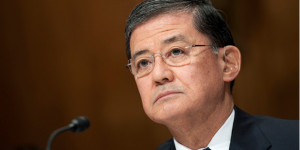
EDITORIAL—Executive cabinet secretaries act as proximate ministerial frontbenchers of unitary systems in our own unique federal arrangement. While in unitary government, the “cabinet,” or more properly, those ministers in “the government” report to and serve at the pleasure of a prime minister. In American federalism, cabinet secretaries report to a president, who unlike a prime minister, is wholly independent of the legislature. Similarly, both these ministers and secretaries are vested with a portfolio, or a specific policy area and bureaucratic institution to oversee for the executive.
For instance, in the Westminster system of Britain, there’s a Minister of Defense, similarly in the United States, there is a Secretary of Defense; to further the point, in Britain we find a Minister of Justice, and in America, an Attorney General, who oversees the Department of Justice. Importantly, the analogies between the two systems end with the dismissal of recalcitrant or incompetent sub-executive functionaries. In British politics, “cabinet reshuffles” are a relatively common occurrence in parliamentary government. In fact, in 2012, UK Prime Minister David Cameron reshuffled his cabinet, firing several ministers in his government—his disgraced ministers, destined for the undesirable backbenches of the Palace of Westminster. Cabinet dismissals in the United Kingdom are much more common than with their counterparts “across the pond” in Washington.
Some observers have noted that President Obama is particularly reluctant to dismiss members of his cabinet for grievous missteps and general malfeasance. In the annals of American history, scholars actively debate the last true presidential “firing” of a cabinet secretary. Often, it is more common for a president to demand a cabinet member resign his post, in order to avoid a formal firing. Truly, there is an important distinction between resigning under duress and a formal termination. While they both have the same effect, the removal of an embattled secretary, resignations and terminations send two distinct messages—particularly, messages on a president’s ability to lead with conviction and a president’s capability to be decisive under pressure.
President Obama has yet to fire a key member of his cabinet. In 1973, even amongst, arguably, the greatest constitutional crisis in American history, the Saturday Night Massacre, President Richard Nixon’s Attorney General, Elliot Richardson, resigned under great duress stemming from a disagreement as to the limits of presidential power relating to the Watergate scandal. Further, President Nixon only fired one cabinet secretary, Interior Secretary Wally Hickel, due to Hickel’s controversial remarks against the Nixon administration’s policies in Vietnam. Perhaps the most impactful “cabinet reshuffle” in modern times stems from Georgia’s own Jimmy Carter and his subsequent dismissal of four cabinet secretaries in 1979 amidst a slumping economy and growing sociopolitical turmoil in the Middle East with rising global oil prices.
In the twenty-first century, President George W. Bush’s only high-level cabinet firing was with Treasury Secretary Paul O’Neill, early in his administration, for O’Neill’s open and public disagreement with Bush-era policies. Quite possibly, cabinet membership and the differing antecedents for secretarial and ministerial dismissals in both British and American politics stem from differences in political cultures. To be fired from a cabinet-level post in American politics is to be put into a much more precarious situation. Surely, in British politics, a ministerial dismissal is disgraceful, though a member of parliament (MP) who finds himself tossed from the government is merely relegated to the backbenches of the House of Commons; not totally removed from the majority party of their seat in the legislature. In American politics, a fired secretary is thrown out of governing entirely—pulled from the lofty executive suites of American bureaucratic agencies and formally shamed for their administrative neglect or general incompetence. Since cabinet secretaries are typically senior leaders of the president’s own political party, a forced resignation is typically perceived as a lesser indignity; the political heavyweight equivalent of “saving face.”
To that end, Veterans Affairs Secretary Eric Shinseki did not deserve the opportunity to “save face” and sign, what was likely, a pre-drafted resignation letter during his meeting in the Oval Office with President Obama on Friday. No, the president should not have relieved Secretary Shinseki of his command, thereby sending a strong message of the importance of ensuring top-quality care for our nation’s veterans. Shinseki resigned his position following revelations that the waitlist for care at a Phoenix, Arizona VA hospital failed to report over 1,700 wounded and disabled veterans on the roll to create the appearance of faster and expeditious service times. The Department of Veterans Affairs has a strict 14 day waiting period for care and there is a real possibility that VA medical centers have manipulated their patient rosters in order to conform to federal guidelines.
An argument can be made that in the large federal bureaucracy, a cabinet secretary and agency head may not be aware of systemic care issues at a single VA hospital—a reasonable contention given the scope and sheer size of the VA. However, the Office of the Inspector General of the Department of Veterans Affairs, the watchdog tasked with overseeing and policing the VA, has stated that there appears to be a system-wide issue with veteran’s care and is expanding the scope of their investigation to over forty VA medical centers. In fact, monetary bonuses to VA medical staff may be an overriding factor in incentivizing the appearance of decreased wait times.
Despite Sec. Shinseki’s inability to manage VA medical facilities and ensure adequate wait times for wounded veterans, it is important to remember the man behind the scandal. Shinseki was a West Point graduate; a distinguished soldier, having attained the rank of general prior to his retirement from the Army in 2003; Army Chief of Staff; a well-seasoned and decorated officer; and a wounded veteran himself. Shinseki was serving with the 5th Calvary in 1971 when a landmine severed his foot from his body during the Vietnam War.
For this, Shinseki should be held to a higher standard. Shinseki was a soldier and wounded veteran. When Shinseki was elevated to serve in the president’s cabinet overseeing the VA, it sent a message to veterans across the nation that President Obama wanted an injured veteran to oversee the care of America’s battle wounded. To have gone through the pain of a battlefield injury, the intensive medical care, and lengthy rehabilitation, Sec. Shinseki was uniquely positioned as a wounded warrior and an astute former military administrator to head the agency charged with resolving veteran’s issues. There is no doubt that Sec. Shinseki failed in his mission.
Rightfully so, in American government, veterans are seen as almost untouchables to the winds of political deal and policymaking. These men and women of the United States uniformed services risk life and limb to defend our nation and the rights and privileges inherent to it. War is hell—to employ the well understood colloquialism. When our injured veterans return home from the front, they deserve a warm welcome from a grateful nation. Our wounded veterans deserve the best and fastest care possible; anything else is to equivocate on their service. A cabinet-level administrator must be tough. Bureaucracies are unwieldy organizations. Secretaries must be able to resolve the most pressing concerns of an institution. Unequivocally, when American veterans are delayed care—they are denied care. Our veterans represent the best in America; to that end, they deserve the very best. If there is a systemic issue in wait times for our veterans, this should be well understood at the highest levels of the organization. If it is not, new administrators must assume the mantle of leadership and seek to resolve the issues that plague the embattled agency.
On a more substantive point, what overarching purpose does VA healthcare serve? It is the opinion of this author that our nation’s veterans should not be compelled to go to government-owned and operated VA medical centers for treatment of sustained battlefield injuries. Would it not be more efficient for veterans to simply visit any of our nation’s hospitals for their healthcare needs and be simply reimbursed for the treatment received? This would solve the “backlog” of VA patients currently awaiting medical care. Surely, we’d see a reduction in VA costs because of the elimination of unnecessary hospital and medical bureaucracies. Further, veteran’s reimbursements would strengthen private medical centers and fund private healthcare over the current government monopoly over VA care.
When President Obama called Sec. Shinseki to the Oval Office Friday for a “serious meeting,” the former VA secretary’s fate was predetermined. President Obama had already planned to demand Shinseki’s resignation. President Obama should have simply fired Sec. Shinseki. It would have sent a different message, a message that President Obama was deeply appalled by the VA’s treatment of our nation’s veterans. Regardless of Shinseki’s laudable military record, for the countless veterans who died waiting to receive treatment, the former VA secretary’s incompetence to manage his agency, warranted a disgraceful dismissal. Shinseki was let off easy—that much is for certain. Shinseki’s termination would not have brought back the countless veterans who died waiting to receive care, but it would’ve sent a stronger message to the American public that the president recognized that we have to do better, and we must do better with the care of our wounded warriors.
President Obama may be a strong policy wonk, a sound legal scholar, and a tenured executive—but he is “gun shy.” His cabinet is an extension of his office. The cabinet is primarily tasked with not only overseeing federal agencies and their execution of federal law, but also to implement the president’s own legislative and political agenda. To that end, when a cabinet officer fails, the president does as well. When Sec. Shinseki failed, so did President Obama. The president should have dismissed Shinseki to stand in ardent and steadfast solidarity with the veterans and their families who will never receive the care they so rightfully deserved. Our nation would not exist without those who continue to heed the call to defend the blessings of liberty. When we fail to stand with our wounded veterans, we fail to uphold the very creed our servicemen fight and die for in wars past and future. For this, Shinseki’s termination would have been the first step to restore the mission of the Department of Veterans Affairs and ensure proper care for our American servicemen—for anything else is an equivocation on the service of our wounded veterans.











